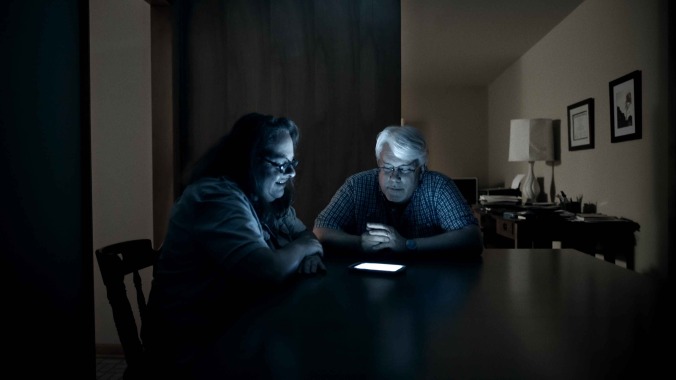Nothing is necessarily what it seems in the sneaky whistleblower doc Enemies Of The State
Exec-produced by Errol Morris, this deliberately deceptive film weaponizes viewer’s expectations
Film Reviews Enemies of the State
A couple of weeks ago, documentary filmmaker Morgan Neville took considerable heat for employing an artificial recreation of Anthony Bourdain’s voice in Roadrunner. People were outraged not so much by the manipulation itself (which is sparingly used) as by its concealment; we have no reason to doubt the authenticity of what we’re hearing, and the film provides no indication that anything’s been fudged. In one trivial sense, that’s decidedly not an issue in Enemies Of The State, which clearly labels all such ploys: When actors lip-sync to audio recordings of a Canadian asylum hearing, onscreen text specifies what’s real and what’s fake, and the same is true of scenes that have been wholly recreated based on court transcripts. All the same, this sneakily provocative doc—produced by Errol Morris, whose 2014 book Believing Is Seeing concerns the inherently deceptive nature of photography—serves less as a work of investigative journalism than as a fascinating object lesson in how easy it can be to mislead without ever actually lying.
That’s not to say that Enemies lacks surface interest, by any means. Its subject is Matt DeHart, a former intelligence analyst who spent his spare time, roughly a decade ago, involved with the hacker collective known as Anonymous. After receiving what he claims were highly sensitive documents containing proof of CIA misdeeds, DeHart wound up indicted on charges related to child pornography (he allegedly catfished underage boys into sending him explicit photos and videos, using two female aliases), eventually pleading guilty in order to avoid the risk of a decades-long prison sentence. He still maintains, however, that the U.S. government invented these crimes to prevent him from disseminating the classified documents, copies of which he mailed (on thumb drives) to overseas associates prior to his arrest. And that’s merely the barest outline of his remarkable story, which at one point sees him cut off his court-mandated ankle monitor and flee to Canada with his parents, begging for asylum on the grounds of federal persecution.
Director Sonia Kennebeck, who appears to specialize in whistleblower documentaries (her other films include National Bird, about abuses of the U.S. drone program, and The United States Vs. Reality Winner), has taken some cues from Morris here, having her interview subjects speak directly to the camera, Interrotron-style, and staging dramatic recreations of key moments (which, again, are expressly noted as such). She spent what appears to be at least several years on the project, speaking frequently with DeHart’s father, Paul, and his mother, Leann, both of whom served in the U.S. military and are deeply distressed by what they see as the country’s betrayal of both their son and its own ideals. DeHart’s attorneys point out various inconsistencies in the official narrative, noting that a declassified report reveals that he was detained and interrogated at one point for national security reasons having nothing to do with the child-porn charges, and that a judge questioned the strength of those charges in open court when issuing bond. “The only way to make the facts of this case make sense,” one of the lawyers somewhat ruefully admits, “is to entertain some kind of wild conspiracy theory.” For a long time, Enemies Of The State appears to be a straightforward portrait of government corruption, and DeHart a martyr to truth.
As it turns out, though, there’s a reason why Kennebeck opens the film with an Oscar Wilde epigram: “The truth is never pure and rarely simple.” Over time, its perspective subtly mutates, even as its methodology remains exactly the same. One of DeHart’s attorneys relates an anecdote that casts some of what we’ve previously learned in a different light. The whereabouts of the thumb drives, which had seemed suspicious in one direction, come to seem suspicious in another. Interviews with various parties on the prosecutorial side produce a version of the Kuleshov effect, with the new context shifting people’s affect from vaguely sinister (because their input didn’t fit the narrative in progress) to blandly innocuous. Kennebeck doesn’t switch sides, exactly—when some late-breaking evidence casts serious doubt on DeHart’s story, she takes care to include a journalist’s concern about why this especially damning material never emerged during the lengthy period when prosecutors were trying to get DeHart to plead out. (On the other hand, we never do learn where it came from.) But she obviously could have structured the entire movie with uncertainty at its core. She chose instead to encourage assumptions, founded on our understanding of how documentaries like this one generally work, and then deliberately undermine them, in much the same way that director Bart Layton toys with viewers toward the end of The Imposter. Anyone who knows the disposition of DeHart’s criminal case will spend the entire film asking themselves one obvious question. Kennebeck answers that question at the very end, in a way that’s a mighty “Fuck you.”
2 Comments
That’s kind of what the first season of Serial did, but unintentionally.
Wait, does Will Smith lose his blender in this one as well?